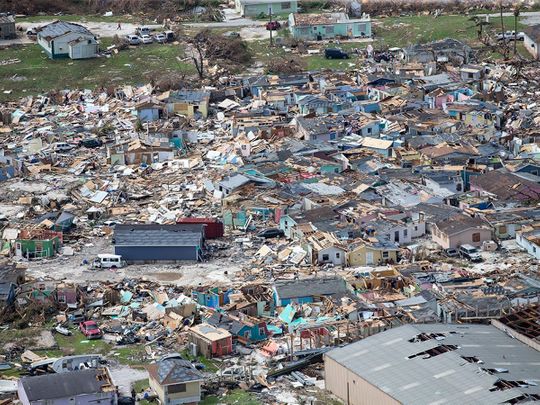
Nassau, Bahamas: Using boats, helicopters and even jet skis, Bahamian, US and British teams engaged in a hectic rescue effort on Wednesday for victims of Hurricane Dorian, which caused unimaginable destruction in the Bahamas.
“Speed is of the essence,” Red Cross official Stephen McAndrew said of rescue operations for the estimated 76,000 people on the two islands in the Atlantic archipelago, which was pummeled by the Category 5 hurricane.
People on Grand Bahama Island were using jet skis and boats to pluck victims from homes flooded and pulverized by the heavy rain and lashing winds of one of the most powerful storms on record.
The US Coast Guard and Britain’s Royal Navy pitched in with helicopters, conducting medical evacuations, aerial assessments to help coordinate relief efforts, and reconnaissance flights to assess damage.
The International Federation of Red Cross and Red Crescent Societies (IFRC) said it was preparing a “major emergency relief effort” for Grand Bahama and the other severely impacted island, Abaco.
US President Donald Trump said the Bahamas had requested US assistance.
“A big section of the Bahamas was hit like few people have seen before,” Trump said. “They need a big hand.”
Seven deaths have been reported in the Bahamas, but authorities there said they expected the number of fatalities to go up.
Prime Minister Hubert Minnis called it “one of the greatest national crises in our country’s history.”
“There’s severe flooding, there’s severe damage to homes, businesses, other buildings and infrastructure,” Minnis said.
Aerial footage showed scenes of catastrophic damage with hundreds of homes missing roofs, cars submerged or overturned, widespread flooding and boats reduced to matchwood.
The international airport in Freeport, the largest city on Grand Bahama island, was severely damaged and its runways unusable, complicating relief efforts.
‘Lucky in Florida’
As rescue efforts gathered steam, Dorian remained a strong Category 2 hurricane threatening the US east coast states of Georgia and South and North Carolina but leaving Florida largely unscathed.
“We got lucky in Florida, very, very lucky indeed,” Trump said.
The Miami-based National Hurricane Centre predicted Georgia and the Carolinas could be hit with dangerous storm surge of up to 2.4 metres and five to 10 inches of rain.
“We are very well prepared,” Trump said.
At Nassau airport, the thump of helicopter blades could be heard starting at first light as aircrews headed off on rescue missions.
Ambulances were waiting at the airport to take injured survivors to local hospitals and a crowd had gathered anxiously awaiting news of friends and family.
Three young women, students in Nassau whose families live on the north of Abaco island, were among those in the crowd.
“All that we have — that we had — is on that island,” said Meghan Bootle, 21. “We have nothing left.”
Her sister, Raevyn Bootle, 18, said many injured residents were waiting to get out of Abaco.
“We hope the government will give clearance to land the planes, send the boats and help the people off of the island,” she said.
Their cousin, Martysta Turnquest, 25, said they come from a part of Abaco that has not been heard from since Sunday, when Dorian settled over the island as a Category 5 storm and stayed there for two days.
‘Truly shocking’
The US Coast Guard said four MH-60 Jayhawk helicopters had airlifted 19 injured people from the Marsh Harbour clinic on Abaco island to Nassau International Airport on Tuesday.
A British landing ship, the RFA Mounts Bay, launched boats carrying relief supplies for Marsh Harbour and Britain’s Department for International Development said it had deployed a team of three humanitarian experts.
“The images of devastation and destruction across the Bahamas are truly shocking,” said British International Development Secretary Alok Sharma.
“The clock is now ticking to get help to those in need,” Sharma said, echoing the call for urgency from McAndrew, the IFRC deputy regional director for the Americas.
“Now that Dorian is moving away from the Bahamas, there is a window of opportunity to save lives and begin to ease the suffering of these communities,” McAndrew said in a statement.
The Bahamas, a former British colony, gained its independence in 1973 and is a member of the Commonwealth.
Dorian, which dumped as much as 30 inches of rain on the Bahamas, was downgraded Tuesday morning to a Category 2 hurricane on the five-level wind scale.
But the NHC said it remained a “powerful hurricane.”
At 2pm (10pm UAE), Dorian was packing winds of 165 kilometres per hour and located about 180km east of Jacksonville, Florida, and 180 miles south of Charleston, South Carolina.
It was moving in a north-northwest direction at nine miles per hour.












